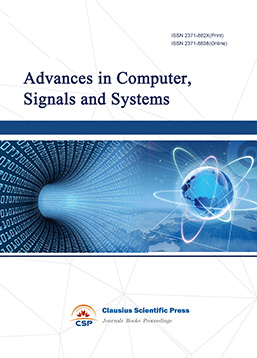Construction and Planning of Smart Tourism Laboratories in Tourism Colleges under the Background of Artificial Intelligence
DOI: 10.23977/jaip.2025.080303 | Downloads: 10 | Views: 208
Author(s)
Xuewei Zhang 1
Affiliation(s)
1 School of Tourism Data, Guilin Tourism University, Guilin, Guangxi, 541006, China
Corresponding Author
Xuewei ZhangABSTRACT
With the rapid advancement of artificial intelligence technology, smart tourism has emerged as a new trend in the tourism industry. As a key institution for training tourism professionals, tourism colleges and universities play a crucial role in this trend. Establishing smart tourism laboratories is vital for enhancing students practical skills and innovation capabilities, and for meeting the evolving demands of the tourism industry. This paper explores the construction and planning of smart tourism laboratories in tourism colleges and universities within the context of artificial intelligence. It analyzes the necessity of such laboratory construction, outlines the goals, principles, and specific plans for the laboratorys development, including hardware facilities, software systems, faculty teams, and curriculum frameworks. Additionally, it offers recommendations for the management and operation of these laboratories, aiming to provide a reference for the establishment of smart tourism laboratories in tourism colleges and universities, thereby promoting the improvement of talent cultivation quality and the intelligent development of the tourism industry.
KEYWORDS
Artificial Intelligence; Tourism Colleges; Smart Tourism; Laboratory ConstructionCITE THIS PAPER
Xuewei Zhang, Construction and Planning of Smart Tourism Laboratories in Tourism Colleges under the Background of Artificial Intelligence. Journal of Artificial Intelligence Practice (2025) Vol. 8: 15-19. DOI: http://dx.doi.org/10.23977/jaip.2025.080303.
REFERENCES
[1] Wang Jinwei, Deng Aimin, Yan Rong, et al. AI-driven Restructuring of the Tourism Discipline System: New Opportunities, New Issues, and New Paradigms [J/OL]. China Ecotourism, 1-14 [2025-06-17]. http://kns.cnki. net/kcms/detail/10.1008.N.20250417.1609.004.html.
[2] Kuang Huixia. Research on the Training Model of Applied Tourism Talents in Higher Vocational Colleges under the Background of Smart Tourism [J]. Tourism and Photography, 2023, (10): 124-126.
[3] Guo Ximei, Li Qinglei, Yin Xiaoyin, et al. Research on the Practice Teaching Model of Tourism Management Based on the Cloud Class Platform [J]. Experimental Technology and Management, 2020, 37(01): 176-180. DOI:10. 16791/j. cnki.sjg.2020.01.043.
[4] Yu Ping, Zhu Wei, Gao Jiangjiang. Construction of a Tourism Laboratory Based on the 'Smart Scenic Spot' Model [J]. Experimental Technology and Management, 2016, 33(07): 237-240.
[5] He Xiaofen. Application of Project-based Teaching Method in Tourism Education in Secondary Vocational Schools [J]. Contemporary Tourism, 2021, 19(17): 88-89.
[6] Gao Mengdi. A Discussion on the Path of Strategic Human Resource Development and the Development of Emerging Industries [J]. Talent Resource Development, 2023: 74-76. DOI:10.3969/j.issn.1003-1073.2023.17.034.
[7] Shan Minglei, He Xin, Zhu Lin. New Exploration of Comprehensive Experimental Teaching Construction in Tourism [J]. Contemporary Education Practice and Teaching Research, 2020, (14): 103-104. DOI:10. 16534/j.cnki. cn13-9000/g.2020.1584.
[8] Yu Fei. Research on Teaching Strategies of Business Administration Courses in Higher Vocational Colleges from the Perspective of Digital Economy [J]. China Management Informatization, 2024, (14): 229-231.
[9] Zhao Yilin. Research on the Evaluation Model and Application of Safety Risks in University Laboratories [D]. China University of Geosciences(Beijing), 2023. DOI:10.27493/d.cnki.gzdzy.2023.000356.
| Downloads: | 15032 |
|---|---|
| Visits: | 475530 |
Sponsors, Associates, and Links
-
Power Systems Computation

-
Internet of Things (IoT) and Engineering Applications

-
Computing, Performance and Communication Systems

-
Advances in Computer, Signals and Systems

-
Journal of Network Computing and Applications

-
Journal of Web Systems and Applications

-
Journal of Electrotechnology, Electrical Engineering and Management

-
Journal of Wireless Sensors and Sensor Networks

-
Journal of Image Processing Theory and Applications

-
Mobile Computing and Networking

-
Vehicle Power and Propulsion

-
Frontiers in Computer Vision and Pattern Recognition

-
Knowledge Discovery and Data Mining Letters

-
Big Data Analysis and Cloud Computing

-
Electrical Insulation and Dielectrics

-
Crypto and Information Security

-
Journal of Neural Information Processing

-
Collaborative and Social Computing

-
International Journal of Network and Communication Technology

-
File and Storage Technologies

-
Frontiers in Genetic and Evolutionary Computation

-
Optical Network Design and Modeling

-
Journal of Virtual Reality and Artificial Intelligence

-
Natural Language Processing and Speech Recognition

-
Journal of High-Voltage

-
Programming Languages and Operating Systems

-
Visual Communications and Image Processing

-
Journal of Systems Analysis and Integration

-
Knowledge Representation and Automated Reasoning

-
Review of Information Display Techniques

-
Data and Knowledge Engineering

-
Journal of Database Systems

-
Journal of Cluster and Grid Computing

-
Cloud and Service-Oriented Computing

-
Journal of Networking, Architecture and Storage

-
Journal of Software Engineering and Metrics

-
Visualization Techniques

-
Journal of Parallel and Distributed Processing

-
Journal of Modeling, Analysis and Simulation

-
Journal of Privacy, Trust and Security

-
Journal of Cognitive Informatics and Cognitive Computing

-
Lecture Notes on Wireless Networks and Communications

-
International Journal of Computer and Communications Security

-
Journal of Multimedia Techniques

-
Automation and Machine Learning

-
Computational Linguistics Letters

-
Journal of Computer Architecture and Design

-
Journal of Ubiquitous and Future Networks


 Download as PDF
Download as PDF